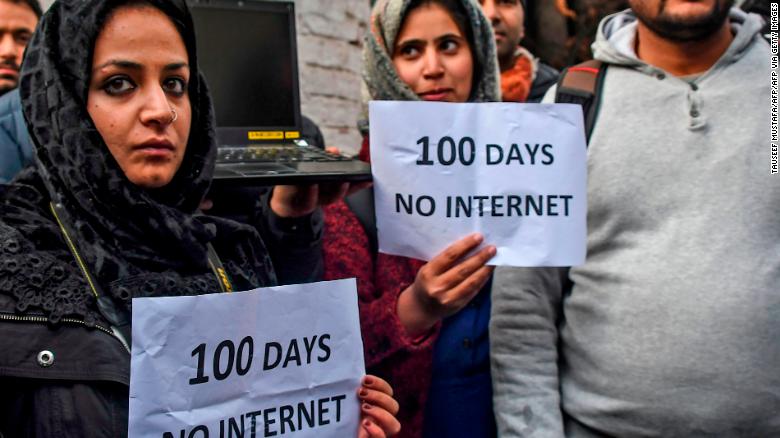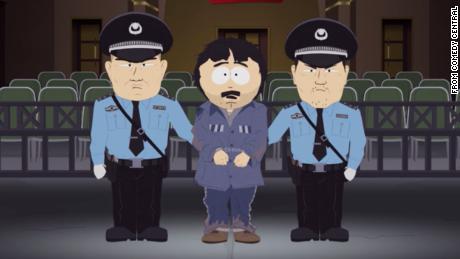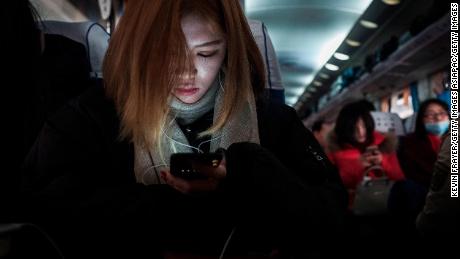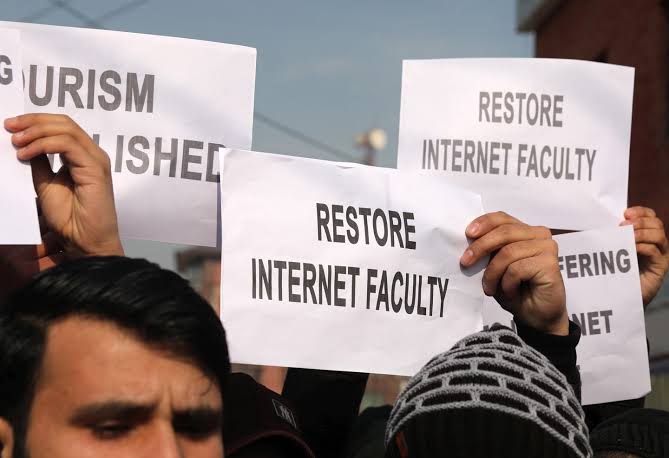Rare Internet Shutdowns Are Now Increasingly Becoming The Norm In Much Of The World
LAHORE MIRROR (Monitoring Desk)– At the start of this year, as Zimbabwe cut off internet access across the country following anti-government protests, the internet pressure group Keep It On warned that such “shutdowns must never be allowed to become the new normal.
“Twelve months later, however, that’s exactly where we are.

Kashmiri journalists protest against internet blockade put by India’s government in Srinagar on October 12, 2019.
An ongoing internet blackout in Indian-controlled Kashmir is now the longest ever in a democracy — at more than 135 days — according to Access Now, an advocacy group that tracks internet freedom. Only the autocratic governments of China and junta-era Myanmar have cut off access for longer.
The blackout came as Indian troops flooded into Kashmir following New Delhi’s removal of the region’s legal autonomy. But the shutdown left some Kashmiris unaware of the reason the internet had been cut. And without internet access, they have been largely removed from the conversation ever since, so difficult is it for people in the region to get their messages out.
Kashmiris have been without internet access for so long that WhatsApp has reportedly begun deleting their accounts for inaction.David Kaye, the United Nation’s special rapporteur on freedom of opinion and expression, has described the ongoing shutdown as a “communications siege” and “collective punishment without even the allegation of an underlying offense.
“This week, the tactic spread to other parts of India, as authorities in multiple regions, including in parts of the capital New Delhi, cut phone and internet services amid widespread protests over a controversial citizenship bill. Tens of millions of people have been affected by the most recent shutdowns.
The move has attracted widespread outrage and seen pushback from politicians and even some judges.India’s increased internet censorship has been greeted with delight in China, however, where state-run media pointed to it as an endorsement of Beijing’s own authoritarian approach.
The People’s Daily said this week that India’s example showed “shutting down the internet in a state of emergency should be standard practice for sovereign countries.”
Where it all began
Following ethnic riots and violent unrest in the far-western province of Xinjiang in 2009, the Chinese authorities cut off internet and phone access for the entire region.While blackouts had occurred in spots around the globe before, they were normally accidental, caused by damage to the undersea cables which power much of the internet.
Even as Xinjiang went dark, cutting people off from friends and family, and ruining businesses that depended on the web, it seemed like an aberration, the type of tactic only an authoritarian regime like China’s would, or could use.
In the 10 years since, the internet has created a communications revolution across the developing world, with many countries leapfrogging older technologies and adopting smartphones, social media and mobile payments, driving economic growth and linking communities.
As more and more countries have seen the internet being used to organize for political change, however, internet blackouts have become increasingly common, a go-to tool for controlling unrest and stifling criticism of the government.
Nor is the tactic limited to authoritarian states: the worst offender by far is India, the world’s biggest democracy.African states have also embraced the tactic, with Zimbabwe, the Democratic Republic of Congo, Chad and Ethiopia all cutting off internet access in an attempt to rein in anti-government protests.This is in line with a general pattern of increased online censorship.
It’s partly due to the spread of more sophisticated technology that makes it easier, and cheaper, to monitor and filter traffic online. It’s also influenced by a shifting perception of internet censorship, which once used to be seen as something of a losing battle.
China’s Great Firewall, however, has proved beyond doubt that not only can the internet be controlled, but that doing so can help prop up the regime and prevent opposition movements from getting off the ground.
Despite arguably kicking off the trend of internet shutdowns, Beijing is not a frequent offender in this regard.
Chinese censorship is generally sophisticated enough that the authorities don’t need to use such a blunt instrument as shutting off all access — they achieve the same purpose by filtering what can be discussed in the first place.
For other countries, particularly in the developing world, simply turning off the internet can be an attractive shortcut to this level of control. Shutdowns give police a freer hand to reign in unrest without the type of hyper-scrutiny on social media that has become common in highly-connected societies, and enable the government to ensure that its message is the only one heard on a particular topic.
In 2018, there were 196 internet shutdowns globally — mainly in Asia, Africa and the Middle East — according to Access Now. In the first half of this year alone, there were 128, and 2019 looks to be the worst year on record.
According to Freedom House, a Washington-based NGO, almost half of the world’s population lives in a country “where authorities disconnected internet or mobile networks, often for political reasons.”

Major ramifications
Losing internet access isn’t merely an annoyance — it can deprive people of vital information during periods of unrest, putting them at risk. It also restricts the media’s ability to hold government or security services to account.
Much of the global economy depends on communications technology — everything from high-speed stock trading to logistics and delivery services — and internet shutdowns can have major economic repercussions too.
The Indian Council for Research on International Economic Relations estimates that between 2012 and 2017, shutdowns cost the country’s economy more than $3 billion, and there have been many more blackouts in the years since.
“Shutdowns impact the ability of citizens to get accurate information from government sources in times of unrest or emergency. It also becomes harder for citizens to contact family members and friends in other parts of the country, or in other countries,” according to the Internet Society.
“The efforts of first responders and healthcare providers can also be hindered if a shutdown prevents their ability to effectively coordinate and communicate in the event of an emergency or natural disaster.
“The methods behind an internet shutdown, particularly a complete one, are fairly straightforward. The government simply orders internet service providers (ISPs) to drop connections to the outside world — like turning off a home modem, but for the entire country.
When a complete shutdown is in place, there is often no way around it. Anti-censorship tools like VPNs don’t work when there is no internet connection for them to use.
Kashmiris have nicknamed a train which runs to the neighboring territory of Jammu “The Internet Express,” as so many of them use it daily to check their email and keep their businesses running.
Alternative means of providing internet access are largely in their infancy. Satellites which beam in broadband are expensive and depend on private companies being willing to defy governments.
Mesh networking, which uses phone and router connections to create a peer-to-peer chain from a cut off area to the open internet, requires a level of consistent population density that isn’t necessarily in place in many areas, such as Kashmir, affected by internet shutdowns.

What can be done?
In many instances, especially blanket shutdowns, internet blackouts may breach rights guaranteed by the 1948 Universal Declaration of Human Rights and other international treaties. The United Nations has also affirmed member states’ responsibility to protect people’s access to the internet and freedom of expression online.
Peter Micek, general counsel for Access Now, said that “every internet shutdown should be tracked and called out by the United Nations.”Not only are such blackouts potentially in breach of UN-protected rights, but they also obstruct international aid work, security and development, he added.
Micek said that while human rights bodies have long called out censorship, “we now look beyond, to technical bodies like the ITU, funding institutions, regional bodies like ASEAN and the African Union, to the UN Secretary General himself to make clear that shutdowns are unacceptable measures, an affront to the law of nations.
“Having rights and enforcing them are quite different, however. In India, some individual shutdowns have been challenged in the courts, and there is an ongoing effort to change the country’s law on internet shutdowns to make them more difficult to impose.According to Access Now, growing awareness of the damage caused by internet shutdowns has led to more frequent challenges in the courts.
“Even when a court doesn’t directly rule in favor of the plaintiff, or even hear the case, taking legal action can have a positive impact for the human rights of those suffering under the shadow of internet shutdowns,” the group said.
Many of these cases have been brought by individuals, not internet companies, even though they are often the most affected by shutdowns.
Access Now and others have argued that industry could be playing a much wider role in this fight, contributing both financial and reputational weight.
In the US for example, Apple fought hard against an attempt to get it to undermine encryption for the FBI.But in many countries, courts are underpowered and unlikely to challenge shutdowns.
Many governments are also following China’s lead in writing the ability to filter and control the internet into law. Industry has shown itself unwilling to challenge governments, such as Beijing, where there is little chance of success in court — including Apple.
“The business community can band together in their existing associations … and demand governments rein in their destructive tendency to order internet blackouts and throttling,” Micek said.
“Disclosing the financial cost of shutdowns is a clear way businesses can illustrate the adverse economic impacts to policymakers.”Companies can also refuse to carry out network disruptions and instead challenge governments with legal, lobbying and policy tools, he added.
The year 2019 was when internet shutdowns became a mainstream problem — and the case against them, both economic and political, is undeniable.
With that case proven however, next year internet freedom advocates and anti-censorship organizations face the much more difficult task of working out how to fight back.
SOURCE: CNN INTERNATIONAL

